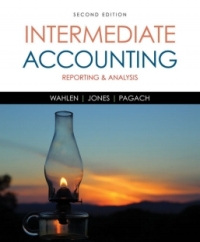Answered step by step
Verified Expert Solution
Question
1 Approved Answer
On October 1, 2021, Marion Hayes launched a computer services company called First Class Systems, which provides consulting services, computer system installations, and custom program
On October 1, 2021, Marion Hayes launched a computer services company called First Class Systems, which provides consulting services, computer system installations, and custom program development. Hayes adopts the calendar year for reporting purposes and expects to prepare the companys first set of financial statements on December 31, 2021.
Using the following transactions, record journal entries, create financial statements, and assess the impact of each transaction on the financial statements.
| October 1 | M. Hayes invested $60,000 cash, a $20,500 computer system, and $10,000 of office equipment in the company. |
|---|---|
| October 2 | The company paid $4,800 cash for four months rent. (The company's policy is to record prepaid expenses in balance sheet accounts.) |
| October 3 | The company purchased $1,800 of computer supplies on credit from Smith Office Products. |
| October 5 | The company paid $3,200 cash for one years premium on a property and liability insurance policy. (The company's policy is to record prepaid expenses in balance sheet accounts.) |
| October 6 | The company billed Jackson Leasing $5,300 for services performed in installing a new web server. |
| October 8 | The company paid $1,800 cash for the computer supplies purchased from Smith Office Products on October 3. |
| October 10 | The company hired John Hayes as a part-time assistant. |
| October 12 | The company billed Jackson Leasing another $2,400 for services performed. |
| October 15 | The company received $5,300 cash from Jackson Leasing as partial payment on its account. |
| October 17 | The company paid $1,000 cash to repair computer equipment that was damaged when moving it. |
| October 20 | The company paid $1,900 cash for advertisements published in the local newspaper. |
| October 22 | The company received $2,400 cash from Jackson Leasing on its account. |
| October 28 | The company billed RST Company $5,400 for services performed. |
| October 31 | The company paid $1,750 cash for John Hayess wages for seven days work. |
| October 31 | M. Hayes withdrew $5,000 cash from the company for personal use. |
| November 1 | The company reimbursed M. Hayes in cash for business automobile mileage allowance (Hayes logged 1,000 miles at $0.32 per mile). |
| November 2 | The company received $4,800 cash from Byrnes Corporation for computer services performed. |
| November 5 | The company purchased computer supplies for $1,600 cash from Smith Office Products. |
| November 8 | The company billed Aloan Company $2,200 for services performed. |
| November 13 | The company agreed to perform future services for Kelley Engineering Company. No work has yet been performed. |
| November 18 | The company received $3,200 cash from RST Company as partial payment of the October 28 bill. |
| November 22 | The company paid $700 cash for miscellaneous expenses. Hint: Debit Miscellaneous Expense for $700. |
| November 24 | The company completed work for Kelley Engineering Company and sent it a bill for $5,400. |
| November 25 | The company sent another bill to RST Company for the past-due amount of $2,200. |
| November 28 | The company reimbursed M. Hayes in cash for business automobile mileage (1,200 miles at $0.32 per mile). |
| November 30 | The company paid $3,500 cash for John Hayess wages for 14 days work. |
| November 30 | M. Hayes withdrew $2,400 cash from the company for personal use. |

Step by Step Solution
There are 3 Steps involved in it
Step: 1

Get Instant Access to Expert-Tailored Solutions
See step-by-step solutions with expert insights and AI powered tools for academic success
Step: 2

Step: 3

Ace Your Homework with AI
Get the answers you need in no time with our AI-driven, step-by-step assistance
Get Started


